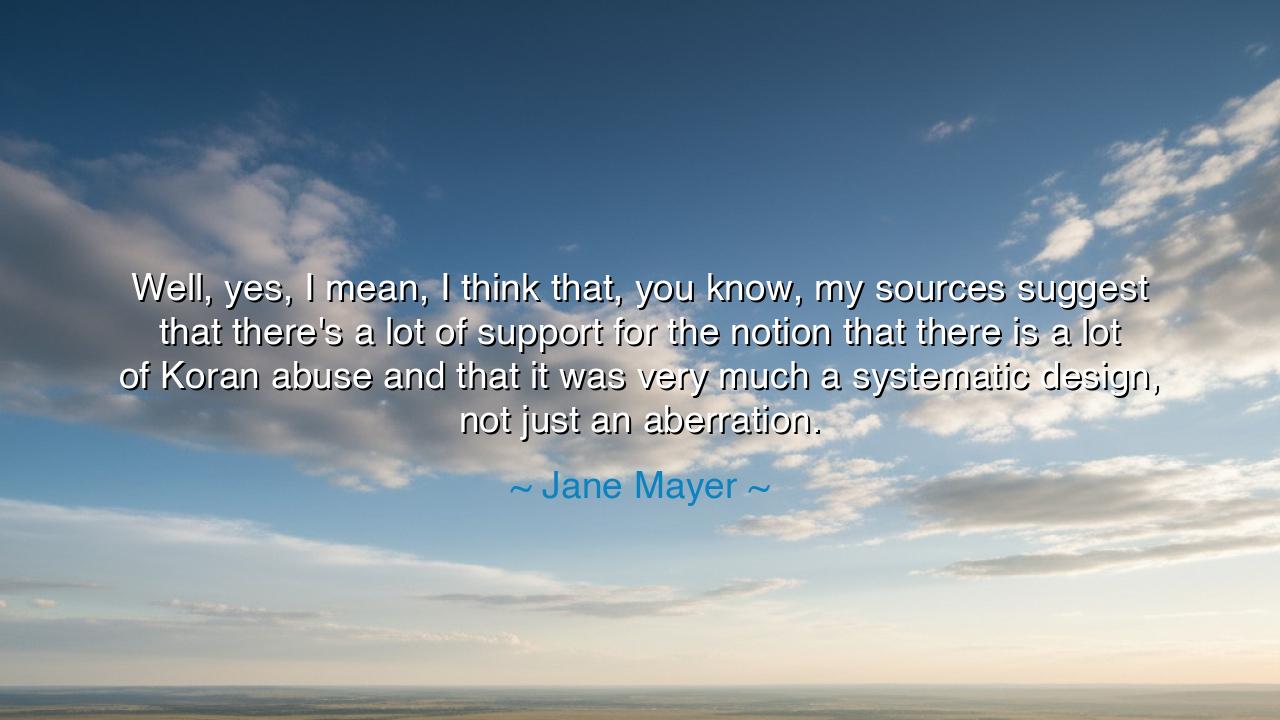
Well, yes, I mean, I think that, you know, my sources suggest
Well, yes, I mean, I think that, you know, my sources suggest that there's a lot of support for the notion that there is a lot of Koran abuse and that it was very much a systematic design, not just an aberration.






“Well, yes, I mean, I think that, you know, my sources suggest that there's a lot of support for the notion that there is a lot of Koran abuse and that it was very much a systematic design, not just an aberration.” Thus spoke Jane Mayer, an investigative journalist whose voice has often carried the weight of conscience amid the noise of political power. Her words are not merely a recounting of facts; they are a lamentation and a warning, spoken from the edge of truth where human dignity and moral blindness collide. In this statement, Mayer unveils a deeper revelation—how cruelty, once born, rarely arises by chance. It grows not from aberration, but from design.
The ancients taught that when injustice appears repeatedly, one must not mistake it for accident, but for pattern. Mayer’s words, spoken in the wake of the War on Terror, refer to reports of abuse against the Koran, the sacred text of Islam, during the years of military detention and interrogation in places such as Guantánamo Bay. To desecrate the book that millions hold holy is not simply an act against an object; it is an assault upon the heart of a people. Mayer, in her careful and sober tone, reminds the world that such acts were not the mistakes of a few, but part of a systematic structure, conceived and perpetuated by design. Her quote pierces through the veil of ignorance to expose how systems of power, when unrestrained by morality, can institutionalize desecration itself.
In her work, Jane Mayer stands in the lineage of truth-tellers who have borne witness when others turned away. She gathered voices from soldiers, interrogators, detainees, and officials, tracing the pattern that wove cruelty into policy. The ancients would have called her a seer—one who looks upon darkness not with hatred, but with unflinching clarity. For she understood that evil, to survive, must disguise itself as necessity, that systematic wrongdoing often wears the mask of national security or patriotic duty. Her words remind us that to defend what is sacred—whether a scripture, a human soul, or the principle of justice—is to defend the very fabric of civilization.
History, too, offers echoes of this truth. Consider the Inquisition of medieval Europe, when acts of torture were sanctified by religious authority. The tormentors of that age believed themselves righteous, claiming that cruelty served faith. Yet their violence was not random; it was systematic, crafted by decree, justified by doctrine, and perpetuated through bureaucracy. The desecration of the Koran in modern times follows the same ancient script—one where the dehumanization of “the other” becomes policy, and the sacred becomes a target, not out of accident, but of intention. Mayer’s statement thus stands not merely as a report of her sources, but as a mirror held to humanity’s recurring sin: the arrogance of believing that purpose excuses barbarity.
Yet, amid this darkness, her words also carry a moral challenge. To recognize that evil is by design is not to surrender to despair, but to awaken vigilance. For if cruelty is designed, it can also be redesigned—overthrown, exposed, and replaced by compassion. The ancients would say that truth, once spoken, becomes a weapon sharper than iron. Mayer’s courage in naming injustice restores the dignity that violence sought to erase. Her words, though heavy with sorrow, are also a call to conscience: that no system, however powerful, stands unchallenged when light is shone upon it.
In every age, there must be those who listen to the silenced and speak their truth. Mayer’s work, like that of all who seek justice, reminds us that silence is complicity. To hear of sacred things defiled and to look away is to join the chain that binds humanity to its worst instincts. But to name the wrong, to trace the pattern, to cry out against design masquerading as chance—this is to take part in the eternal struggle for righteousness. For as long as one voice remains to say, “This was not an aberration,” truth itself endures.
Let this teaching be carried forward: do not dismiss cruelty as accident. When harm repeats itself, seek the pattern; when suffering is widespread, question the structure. Whether in government, in religion, or in daily life, remember that injustice thrives through intention disguised as ignorance. Speak as Mayer spoke—steadily, courageously, without hate but without fear. For truth, when uttered in the face of deceit, becomes a form of sanctity itself.
And so, from Jane Mayer’s somber declaration, we inherit both a warning and a task: to guard against systems that make cruelty common, and to remember that the desecration of what others hold sacred wounds the soul of humanity. For to allow such acts “by design” is to build a world without reverence—and a world without reverence soon forgets how to love.






AAdministratorAdministrator
Welcome, honored guests. Please leave a comment, we will respond soon